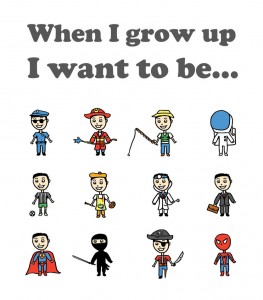 What do you want to be when you grow up? This was a “go-to” question I remember having been asked countless times as a child. My career ambitions ranged from food services to veterinary medicine and (luckily) education. Looking back, my prospective career choices were influenced by my exposure to television shows, toys I played with, important people in my life and personal experiences. After I graduated from high school there seemed to be a finite number of choices available to me and, fortunately, choosing to become an educator was a fairly straight forward decision for me. In contrast, my sister made several different educational changes before choosing a career that she felt fulfilled by.
What do you want to be when you grow up? This was a “go-to” question I remember having been asked countless times as a child. My career ambitions ranged from food services to veterinary medicine and (luckily) education. Looking back, my prospective career choices were influenced by my exposure to television shows, toys I played with, important people in my life and personal experiences. After I graduated from high school there seemed to be a finite number of choices available to me and, fortunately, choosing to become an educator was a fairly straight forward decision for me. In contrast, my sister made several different educational changes before choosing a career that she felt fulfilled by.
As an adult I find myself asking the very same question to students, often curious about their goals, ambitions and influences. Some students answer this question excitedly with limitless aspirations for the future; others divulge that they are not sure what they want to do when they grow up. I am left wondering how both the decisive and the less certain students can be supported in making successful transitions to reach their postsecondary destinations—recognizing that all students can achieve success in many forms and through many different routes.
The challenges and opportunities presented to students of the 21st century are unlike those of any previous generation (Creating Pathways, p. 6) so it is imperative that students have the knowledge and skills they need to make informed education and career/life choices.
Creating Pathways to Success (2013), a document developed by the Ministry of Education to respond to the realities of a complex, rapidly changing world, recognizes that career planning is a lifelong process. The document was developed to support students in their career choices. It provides opportunities for learning both in and outside the classroom and engages parents and the broader community in the development, implementation, and evaluation of the program to support students in their~learning.
Effective September 2014 students from FDK to grade 12 are engaging in education and career/life planning using a four step cyclical inquiry process that will continue throughout their time at school:
- Knowing Yourself – Who am I?
- Exploring Opportunities – What are my opportunities?
- Making Decisions and Setting Goals – Who do I want to become?
- Achieving Goals and Making Transitions – What is my plan for achieving my goals?
Students from FDK to grade 6 will be encouraged to document what they are discovering about themselves and their opportunities in and outside of school in a portfolio called “All About Me.” In grades 7 to 12 students will build on the learning from their portfolio as they develop an Individual Pathway Plan (IPP) which focuses on making a successful transition to secondary school and their initial postsecondary destination. My own children are currently in the process of managing their own IPPs; it has been a fascinating journey watching them explore the pros, cons and requirements of potential career paths.
Where are parents in this picture? Parents play a critical role in student achievement and success. Most students view parents as their primary source of career planning (King et al., 2009 in Creating Pathways, 2013 p. 38). As such, parents will have opportunities to review and observe student evidence of learning within the portfolio. In addition, we have a parent representative on our school-based committee for Creating Pathways.
I encourage you to have conversations that explore who your children are, what opportunities are available to them and what they want to become. For more information on the Creating Pathways document click the image below.

|| click image to read the entire document ||